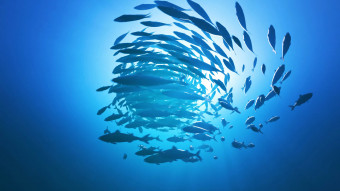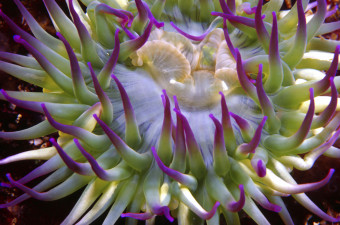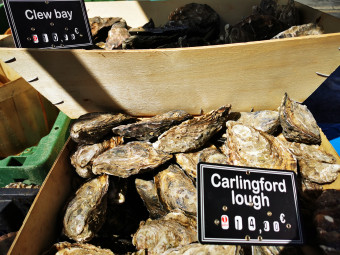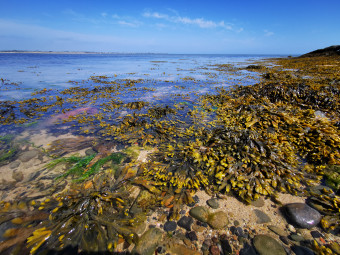Ocean ecosystems encompass a vast diversity of habitats which support an incredible diversity of species. From microscopic plankton which form the basis of marine food chains, to corals, seaweeds, fish, birds, marine mammals and reptiles, healthy ocean ecosystems can support an abundance of life and provide ecosystem services essential to our lives and livelihoods.
In 2025, the UN Trade and Development agency (UNCTAD) estimated that in 2023, global ocean trade reached $2.2 trillion – $1.3 trillion in services and $900 billion in goods – representing around 7% of world trade, and supporting over 600 million people. Over 50% of this trade came from marine and coastal tourism, representing 50% of all global tourism.
The food resources provided by ocean fisheries, coastal plants and algae are essential to the nutritional security of millions of people, with even greater potential to support healthy diets and economic security if these resources are managed sustainably. The UN Food and Agriculture Organisation has estimated that between 2019 and 2021 aquatic animal foods provided at least 20 percent of dietary protein to 3.2 billion people, more than 40 percent of the world’s population. Whilst reliable figures are not available for aquatic plants and algae, research shows enormous potential for these resources to support livelihoods and healthy diets, particularly in low- and middle-income countries.
These food resources and how they are harvested, traded, shared and managed, have enormous cultural and social significance for many millions of people. For example, ocean foods are a cornerstone of many national diets and associated culinary heritage, of value not only to diet and dietary health but to a vast range of associated industries, including transport, retail, hospitality and tourism. The OECD has estimated that the world’s coastlines stretch over an enormous 1.6 million kilometres of territory which is shared by 85% of the world’s countries, with more than 2.4 billion people living in coastal communities which are dependent on fisheries, aquaculture, mariculture, and other ocean-based businesses. Recent research has indicated that the establishment of marine protected areas can have a measurable co-benefit to human health.
The oceans are also an important resource for research and the development of novel pharmaceuticals, and marine ecosystems are of increasing interest to medical science and industry. The extremes of temperature, pressure and exposure associated with many marine habitats and the density of living populations found there has helped give rise not only to a wide diversity of life forms but also a diversity of mechanisms for survival, including evolution of chemical compounds essential for metabolic processes, protection from predators, deterring competitors, and capturing prey. The biological activity of these compounds in nature often involves the same or similar enzymes and receptors that are involved in human disease processes, suggesting possibilities for novel therapeutics. Important pharmaceuticals and potential new drug entities have been derived from chemical compounds isolated from marine molluscs, algae, echinoderms, cnidarians and sponges. These include analgesic, immunosuppressive, antimicrobial, anti-tumour, and anti-inflammatory agents. Other compounds isolated from marine organisms have been of great importance to medical research and healthcare practice, including diagnostic agents and disinfectants.
The oceans also play a vital role in climate regulation, absorbing excess heat and carbon dioxide from the atmosphere and distributing them around the world via ocean currents, regulating global temperatures. The interplay of warm and cold currents is also responsible for the distribution of minerals and nutrients to ecosystems which support ocean diversity.
However, the ability of our oceans to support our health and well-being is under significant pressure from human activities. Overfishing and unsustainable harvesting practices threaten all global fish stocks, whilst pollution, particularly from urban runoff, agriculture and waste management, results in deoxygenated coastal “dead-zones”, exacerbating harmful algal blooms which threaten people, domestic animals and wildlife. Pollution, including marine littering, also harms wildlife and threatens marine food resources and is responsible for significant human health impacts. The presence of microplastics in marine foods is a growing public health concern.
Human impacts on ocean ecosystems can also impact on the ecology of marine infectious diseases, increasing risks of novel outbreaks. Sea level rise and the increased frequency and severity of storms associated with climate change threatens coastal habitats and communities, as well as freshwater resources close to coastlines. Increased levels of atmospheric carbon dioxide are also driving acidification of the oceans with significant impacts on marine ecosystems.
These are some of the greatest issues facing human health and well-being on a global scale in the coming decades. The solutions are dependent upon partnership, co-operation between governments and across all sectors of society and economic activity.




